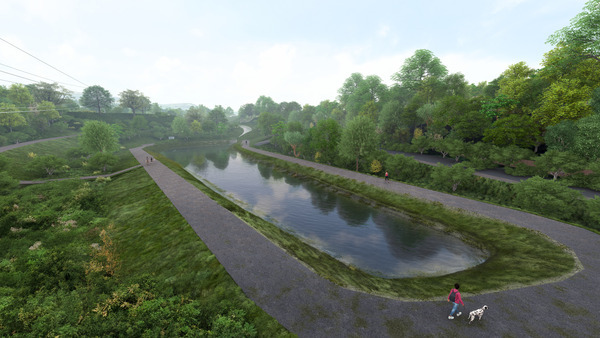A FURTHER £1.2 million of Torfaen Council funding is going towards the redevelopment of a former industrial wasteland.
Councillors agreed to make the funding available for the development of new waterways at The British site, at Talywain, Pontypool at the same meeting where they also gave their approval for a legal binding agreement with a private developer to bring the land into commercial use, including clean energy generation.
Torfaen Borough Council’s spending on The British could now total more than £9 million, in addition to the amount it paid for the site in 2016, which was criticised by some councillors who also questioned the credentials of “socially focused enterprise” IDRIS that will lead the commercial developments.
Llantarnam independent councillor Alan Slade described the site as a “bottomless money pit”.
He said: “When we asked to buy a former nursing home we were told there is no money, the roads are full of potholes or we look for community facilities for teenagers but there is a blank cheque for the British. Will someone from the executive explain the priorities?”
The full council approved the additional £1.2m to create new watercourses to reduce the flood risk as part of plans revised on cost grounds.
It was originally intended two ponds would hold water but that was estimated to cost an additional £5.2m with only £3.4m remaining in the original £7.6m budget.
Instead just one pond, on the southern end of the site, will be dug with water at the northern end channeled through an open watercourse. The pond will have spare capacity for heavy rainfall and water will be released at a speed an ageing culvert on the eastern side of the site can cope with.
A walkway will run from the Big Arch North entrance around the southern pond with a walking route along the full length of the water channel.
The revised plans will cost a minimum £1.2m more than what is in the current budget, and the council’s capital budget for one off costs has put aside up to £1.5m for the project.
Work could be completed by December 2025 and will address flooding and make the site riddled with former mine shafts safer. The two pond plan would have covered a one in 100 year flood risk plus 40 per cent risk accounting for climate change, the approved plan has only a 20 per cent contingency for climate change but still meets Welsh Government guidance.
In a separate decision, the council approved the plan for a legally binding development agreement for possible energy infrastructure and commercial land uses on The British.
IDRIS intends to develop energy on site, from wind and from watercourses, which would be used by companies based there, including those involved in growing plants using hydroponics. Excess energy could be sold to the National Grid.
Council director David Leech said final agreements would be subject to the council’s satification that appropriate conditions had been met and that IDRIS is aware the creation of a joint venture agreement doesn’t override the council’s responsibilities such as highways requirements or its obligation to consider planning applications independently.
IDRIS, and its funders Substantia Capital, will cover the costs of feasibility studies for the redevelopment, including heritage buildings that could be reused, but the council will transfer land to IDRIS’ recently established development firm 4iR.
Mr Leech acknowledged IDRIS and 4iR do not have a track record but said its directors have provided details of other projects they have been involved with and due diligence, by its advisors, had focused on ethical and financial aspects and said “there haven’t been any concerns”.
He cautioned councillors there is uncertainty around the proposals and said the further developments would only happen if they are feasible.
He said some costs, such as those approved for the watercourse, could potentially be recouped but warned: “That is a big if.”

